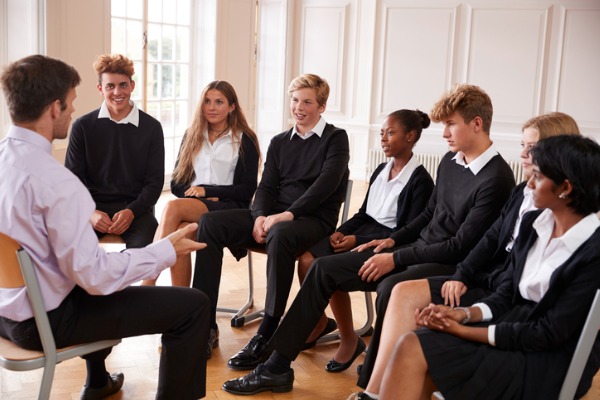Knowing your pupils and localising PSHE for them is crucial in helping them flourish. Dana Abdulkarim explains why devoting time and resource to PSHE is worth it.

As a pupil and even when I first qualified to teach, PSHE and all that comes within it were sleeping dinosaurs in most schools. A curriculum, if you could call it that, of ‘otherness’ from your main learning.
Teachers and leaders didn’t regard it highly. Schools marginalised it. There were no specialist teachers of it – it was simply a gap lesson.
If you were fortunate, you might go to a school that had a deliberate assembly programme, developed aspects of adult life learning in form time or found ways of addressing broad themes through planned enrichment, work experience and careers.
But, for most of us it was ‘chuck a DVD on for sex education’ and be done with it. I remember watching a very dated video in one biology lesson and that was that. No discussion. No chance to explore. No representation of different kinds of intimacy or diverse relationships. It was ‘2.4 children’ norm education.
And what did children learn about themselves?
Well, not very much. I think education’s collective view that this broader education just happened elsewhere lead to a society of young adults that couldn’t understand the world they belonged to, with poor knowledge of avoiding risk and probably still a lot of questions!
By not talking about it, by not giving it space to thrive, we made it taboo. And look where that left us? In my local area we had high levels of teenage pregnancy and STI’s and nobody talked about mental health.
This is the subject that if renamed ‘how to be a human’, we would all understand
Fast-forward to the DfE (finally) in 2018 publishing their draft policy for statutory relationships education (primary) and relationships, sex and health education (secondary) guidance for first teaching in 2020 and we have a very different landscape for PSHE. Schools that had marginalised the subject then scrambled to find a place for PSHE.
Helped by Ofsted reforms, the subject is now moving swiftly to be critical to personal development objectives. The education inspection framework lifts PSHE as the natural place to anchor much of what is expected in good and outstanding schools.
Specifically, ‘the curriculum and the provider’s wider work support learners to develop their character – including their resilience, confidence and independence – and help them know how to keep physically and mentally healthy’.
And, ‘the provider prepares learners for life in modern Britain by: equipping them to be responsible, respectful, active citizens who contribute positively to society; developing their understanding of fundamental British values; developing their understanding and appreciation of diversity; celebrating what we have in common’ (Guidance EIF, July 2022).
PSHE now needs specialist care. It needs trained and confident teachers. It needs robust ways to monitor practice and ensure accurate information is being shared at age and stage appropriate times. Young people need to be included in the design for their PSHE; it is their right. The best schools utilise student voice and wellbeing data to ensure what is being offered is appropriate.
Parents and families also need support and consultation. The move from almost ‘tick box’ curriculums for PSHE to now deep rooted, deliberate provision has transformed the fortunes for PSHE. The next steps would be to reform ITTE and teacher development – we need PSHE subject specialists.
Good PSHE knows its community
Young people are more aware of the wider world than ever before; the impact of social media on making the world and its challenges seem small have presented a greater need to develop safeguarding curriculums. PSHE helps here too. If you know your community risk factors, you can map a programme for them.
Essentially PSHE now offers regular learning on how to be safe. It provides the taught behaviour for safe challenge and opinion. It teaches young people to be comfortable with the uncomfortable. The very best personal development is wrapped around the curves and learning journey for PSHE. This includes external input, celebrations and school cultures to be united against bullying.
This is the subject that if renamed ‘how to be a human’, we would all understand. We would push it and elevate it further – more time, more depth, more investment. To ignore it now is foolhardy, to get your curriculum ‘off the shelf’ naïve.
Schools must localise their PSHE. Good PSHE knows its community. Good PSHE adds to a child’s sense of nurture, belonging and trust.
It is a special subject that is different in every school but also vaguely familiar. The gift that there is no assessment (in the formal sense), allows for creativity and initiative for teachers. How often do we in education bemoan the assessments methods we all work within? Here is a subject that we can design to work and fit.
If we ignore PSHE’s power and place by continuing to put it in a ‘gap’ on staff timetables we risk damaging another generation of young adults ill-equipped to be themselves, know themselves and challenge what they see.
PSHE might just be the most exciting subject on the curriculum. In four years’ (since the draft curriculum), it has moved from the underbelly of education to the head of the table alongside English and maths. Ignore it and you miss the chance to create environments where the whole child thrives. Profile and invest in it, and you will watch the school flourish.